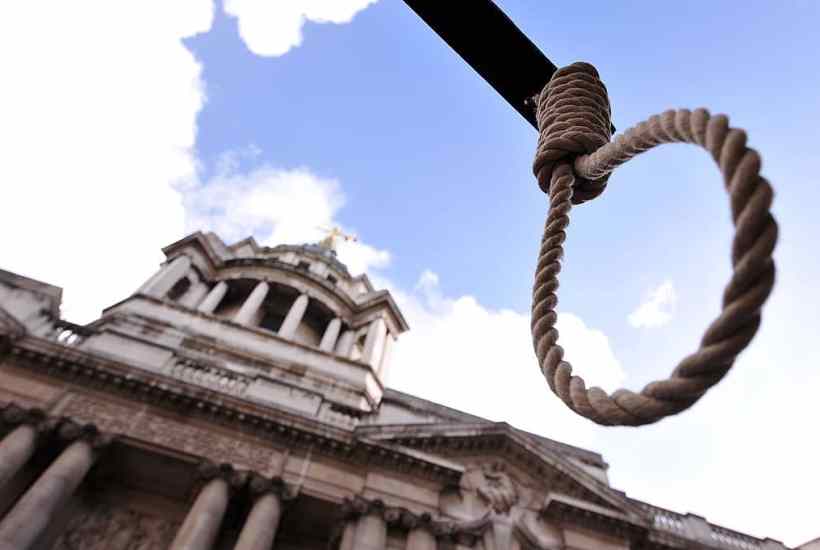It’s been a busy week for hangmen. In Japan, Tomohiro Kato, a 39-year-old man, was hanged at a Tokyo prison for killing seven people and injuring ten others in a 2008 murderous rampage in which he drove a truck into a crowd before stabbing several other random victims. Kato admitted his guilt and blamed his crime on his alienation from society and insults he had received on social media.
It was the second execution in Japan ordered by the government of prime minister Fumio Kishida, who took office in 2021, after the death penalty had been held in abeyance for several years. However, it’s unlikely to be the last. Tetsuya Yamagami, the man accused of assassinating former premier Shinzo Abe with a homemade firearm earlier this month, is currently undergoing mental health evaluation. He may also face the death penalty if found to be sane and convicted.
Meanwhile, in Myanmar (formerly Burma) the military junta which took power in a bloody coup last year announced the execution of four activists imprisoned for opposing the regime: the first official judicial deaths there for a quarter of a century. The victims included Kyaw Min Yu, a writer also known as Ko Jimmy who had already spent 17 years in jail for opposing previous juntas; Phyo Zeya Thaw, a former hip-hop musician who was an MP for Aung San Suu Kyi’s ousted ruling party, was also executed. Approximately 100 other activists have been handed death sentences and await execution.
Not to be outdone, a judge in Egypt has sentenced a 21-year old student, Mohamed Adel, to death for fatally stabbing a fellow student, Naira Ashraf, after she rejected his proposal of marriage. In keeping with the internet age, the judge has also written to Egypt’s parliament demanding that Adel’s hanging be broadcast and streamed live to deter others from following his example.
Elsewhere in the Middle East, Saudi Arabia sparked outrage around the globe in March when 81 people were beheaded on a single day. So, in a world which loudly trumpets its respect for human rights, is the death penalty making something of a comeback?
Though long since abolished in Europe, the Anglosphere and the Americas (apart from the USA), in many parts of the world capital punishment has never really gone away. Fifty-five states still retain the death penalty, with many employing it for other offences besides murder, including political ‘crimes’ and drug trafficking.
With China judicially killing more people than all other nations combined (an estimated 2,400 in 2013 according to Amnesty International), some 60 per cent of the world’s population still live in countries retaining the death penalty. Aside from China, Saudi Arabia, Egypt and Japan, other enthusiastic executioner states include Iran, Iraq, Indonesia, India, Pakistan, Bangladesh, Vietnam, the two Koreas – North and South – Malaysia, Singapore, Taiwan, and Nigeria.
In Europe, Scandinavia led the way in abolishing the death penalty in the 18th and 19th centuries. But many states retained it well within living memory. Understandably, given its recent history, Germany did away with executions after the leading Nazis were hanged at Nuremberg in 1946. Spain was still garrotting people up to the death of the dictator general Franco in 1975; France guillotined its last prisoner in 1977, when a Tunisian-born pimp was beheaded in Marseilles for the kidnap, torture, rape and murder of a young woman.
The last French execution for a crime other than murder was in 1963 when a rocket scientist, Colonel Jean Bastien Thiry, was shot by firing squad in Paris for organising the unsuccessful assassination attempt on general de Gaulle featured in Frederick Forsyth’s thriller ‘The Day of the Jackal’.
As in so many respects, the US is the odd man out among western democracies when it comes to the death penalty, being the only western nation to retain it. Currently 20 states, chiefly in the deep south and midwest, still kill convicted killers – usually after they have spent years on death row fighting lengthy appeal processes. These days, most states have scrapped the traditional electric chair or gas chamber in favour of lethal injections, though some have experienced difficulties in importing the necessary deadly chemicals from countries that disapprove of the death penalty.
In the US, capital punishment has seen a recent comeback. After a long ten-year hiatus in the 1970s when no one was put to death at all following a Supreme Court judgement that the death penalty was a ‘cruel and unusual punishment’ and therefore unconstitutional, state executions resumed in 1977. Double killer Gary Gilmore was shot by firing squad in Utah at his own request after he tired of being on death row. Executions then restarted at full throttle after the Supreme Court reversed its abolitionist stance, and more than 1,500 convicted killers have died since.
The Trump administration introduced federal – as opposed to individual state – executions in 2020 and 44 killers have suffered or await the supreme penalty under federal law since then. Thousands of others remain on death row.
Here in Britain, parliament under a Labour government suspended hangings in 1965 after impassioned debate following the unjust executions of Ruth Ellis, Derek Bentley and Timothy Evans. It finally abolished the death penalty in 1969. Among the first to benefit from its abolition were the child killing ‘Moors Murderers’ Ian Brady and Myra Hindley who spent the rest of their lives in prison.
Roy Jenkins, the home secretary who presided over abolition, saw it as part of his liberalising mission which also included the decriminalisation of male homosexuality and the relaxation of the laws on abortion and divorce. Contrary to his assumption that murders would decrease as the country evolved into a more ‘civilised society’, the murder rate remains high. Horrific recent cases, such as the killing of Sarah Everard by a serving police officer, have sparked particular outrage.
Public disquiet over ‘life sentences’ that fall short of what they promise has resulted in the subsequent introduction of whole-life tariffs for particular heinous killings. Even so, a good number of Brits still favour the restoration of capital punishment, especially for child murders and in the case of serial killers.
Controversy over the death penalty has largely faded as a political issue in Britain; parliament last debated the subject in the early 1980s. But public opinion may demand that the issue is revisited. What is unthinkable today may not remain so tomorrow.
Got something to add? Join the discussion and comment below.
Get 10 issues for just $10
Subscribe to The Spectator Australia today for the next 10 magazine issues, plus full online access, for just $10.




















Comments
Don't miss out
Join the conversation with other Spectator Australia readers. Subscribe to leave a comment.
SUBSCRIBEAlready a subscriber? Log in